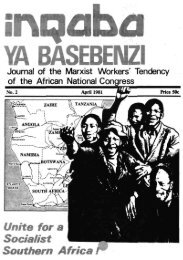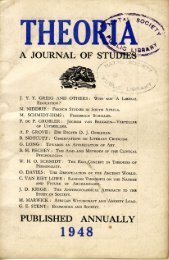Staffrider Vol.5 No.2 1982 - DISA
Staffrider Vol.5 No.2 1982 - DISA
Staffrider Vol.5 No.2 1982 - DISA
Create successful ePaper yourself
Turn your PDF publications into a flip-book with our unique Google optimized e-Paper software.
Bringing The Struggle Into Focus<br />
PETER MCKENZIE<br />
Because of the high level of awareness and frequent acts of<br />
resistance in this country we will regard our culture at this<br />
stage in our struggle as a resistance culture. (We will later<br />
investigate the relevance of this resistance culture to<br />
communication in South Africa).<br />
The poor history of committed photography in South<br />
Africa will reflect the refusal of most photographers to<br />
accept their responsibility to participate in the struggle.<br />
'Whether he likes it or not the photographer is in the<br />
business of communication and it is useless to retreat into<br />
the romanticism of self-expression and technological wizardy.<br />
Useless, because to communicate takes us purely beyond<br />
personal and technical concerns and into phenomena that the<br />
communicator and his audiences share.' — Frank Webster<br />
'We are people before we're<br />
photographers.'<br />
— Duane Michaels<br />
7 am part of all that I have touched and that has<br />
touched me.'<br />
— Thomas Woolfe<br />
This is the basic premise that this paper will follow. 1 believe<br />
that if we are going to become part of the struggle through<br />
photographic communication we must examine and realise<br />
the undeniable responsibility of all photographers in South<br />
Africa to using the medium to establish a democratic Azania.<br />
Our photographic seeing is the direct result of the factors<br />
that contribute to our being here. Our day to day experiences<br />
and our degree of sensitivity to these will determine the area<br />
we isolate in our viewfinder, the moment in time that we<br />
freeze forever.<br />
PHOTOGRAPHIC COMMUNICATION AND CULTURE<br />
'Your child shares in your sense of indignity when you are<br />
stopped outside your yard and asked to produce your<br />
reference book. Your child shares in your sense of outrage<br />
and anger when people arrive in your house in the middle of<br />
th night and take you away, throw you into jail without trial,<br />
and for weeks, even months, refuse your wife the right to see<br />
you.<br />
'As their cars drive off into the night with you, they leave<br />
behind seeds of hatred in the hearts of your small kids.'<br />
— Percy Qoboza<br />
This 'way of seeing' referred to in the introduction, holds<br />
true for the viewer too. We therefore realize the importance<br />
of examining this relationship with our viewers so that they<br />
can understand, interpret and perceive the images that we<br />
transmit to them in the process of communication. Culture<br />
supplies this relationship. To demonstrate this we can<br />
compare photographic communication to an iceberg where<br />
the tip of the iceberg represents the point and the submerged<br />
area the unstated unconscious cultural assumptions that<br />
make communications possible. Communication depends on<br />
the assumption that photographer and viewer share a<br />
common culture.<br />
Photographic communication is possible in our multicultural<br />
society because we are united under oppression. The<br />
chances of being morally affected by photographs is better<br />
than ever before in our struggle because of the level of consciousness<br />
and awareness of the people. Evidences of the last<br />
drawing together of the laager are so evident that those who<br />
don't see them are those who choose to ignore them!<br />
This shows the added responsibility of photographers<br />
in South Africa as oppression continually stifles the inherent<br />
creativity in us. No photographer can lay claim to any<br />
individual artistic merit in an oppressed society.<br />
We must realize at this urgent stage of our struggle the<br />
importance of making a commitment to change through<br />
photographic communication i.e. we've got to take sides in<br />
the struggle as our commitment becomes very evident in our<br />
photographs.<br />
Once we realize the importance of our resistance culture<br />
in photographic communication it becomes clear that we<br />
must examine the factors responsible for this culture so that<br />
we can successfully communicate on a level that the people<br />
are perceptive to.<br />
THE UNIQUENESS OF THE SOUTH AFRICAN<br />
SITUATION<br />
We have already contended that the history of our struggle<br />
has moulded our resistance culture from which our present<br />
dominant beliefs and attitudes are derived. In order to<br />
become more effective in photographic communication we<br />
must examine the factors responsible for these beliefs and<br />
attitudes-<br />
Factors Contributing To Present Political Awareness:<br />
1. The history of the struggle has never before experienced<br />
such frequent acts of resistance. Strikes, guerilla warfare,<br />
boycotts and riots have been the experience of all South<br />
Africans, if not by direct involvement then by the<br />
atmosphere generated by these situations. The intensity of<br />
our struggle is proportional to the time it will take to<br />
achieve liberation!<br />
2. Mounting economic pressure forces people to evaluate the<br />
factors responsible for this pressure. 'A hungry man is an<br />
angry man.' This is especially true in South Africa where<br />
basic commodities needed by the masses for survival are<br />
most severely hit by price increases.<br />
3. When Namibia achieves its freedom we will be surrounded<br />
by countries whose peoples have successfully struggled for<br />
their liberation. We've seen the failure of racist regimes,<br />
we too shall overcome!<br />
4. The Changed Concept Of Power In South Africa: In any<br />
society the culture of that society is strongly influenced<br />
by those in positions of power. If power is a strong<br />
constituent of culture we notice a peculiarity in our<br />
concept of power. Because of our experiences in recent<br />
years we see power as our ability to resist oppressive<br />
measures, e.g. after June '76 we recognise the efforts of<br />
the authorities to quell resistance not as power but as a<br />
STAFFRIDER, VOL. 5 NO. 2, <strong>1982</strong> 17
















